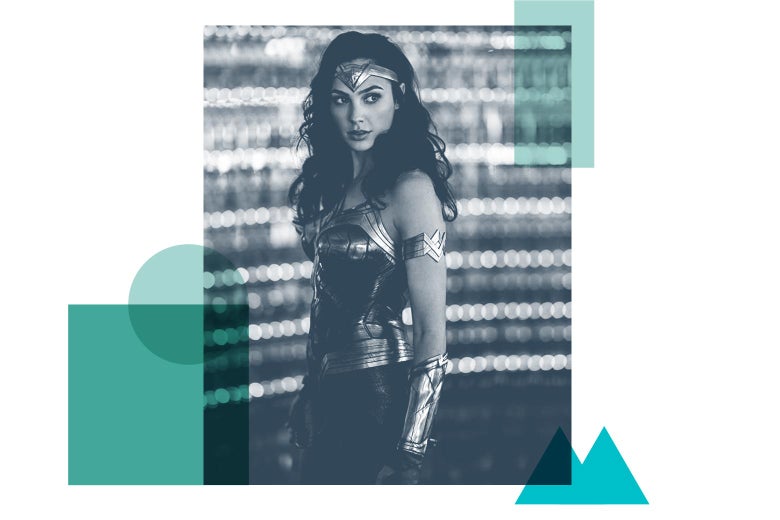Is this the future of blockbusters?

In Slate’s annual Movie Club, film critic Dana Stevens emails with fellow critics—this year, Justin Chang, Odie Henderson, and Alison Willmore—about the year in cinema. Read the previous entry here.
Fellow travelers,
It’s been a few days since I wrote my last dispatch, thanks to a national holiday that some families regard as sacred, others observe in their own secular fashion, and still others decline to celebrate at all. I refer, of course, to the release date of a new superhero movie. Patty Jenkins’ Wonder Woman 1984 debuted, in theaters and on HBO Max, on Christmas Day. The mostly lukewarm critical reviews, and the real-time audience reaction it received, gave us a glimpse of what word-of-mouth in the post-movie-theater age might (please Lord, make that “might,” not “will”) look like. The response was immediate and, for the most part—at least judging by my own blistering social media feeds over the weekend—negative.
What were the actual audience numbers? No one knows for sure, since viewing statistics are a well-kept secret on most of the major streaming platforms. HBO Max has said only that “nearly half” of their retail subscribers viewed the film on its first day of release. Did they watch all the way through? How many individual viewers got in on each $14.99 a month household subscription? What about users who are not “retail” subscribers but receive the service through their cable provider? We’ll never know! At any rate, Warner Bros. has already announced it’s moving forward with a sequel, as if its long-delayed tentpole had opened in theaters to a record-smashing weekend—when in fact the film’s physical box office receipts so far represent only a minuscule portion of its $200 million budget.
Maybe WW84 will wind up being what Christopher Nolan, the complexly written villain of our last round, grumbled that Tenet might wind up being for the same company: a loss leader, dangled as bait to squeeze what little theatrical income there was to get from a property that would mainly be used to drive new HBO Max subscriptions. The ethics of this dual strategy in the midst of a deadly global pandemic are, as established in the last round, debatable. But it seems that faced with that essential movie question of 2020—whither movie theaters in the post-COVID age?—one of Hollywood’s few surviving Golden Age studios has decided that … whither our new streaming service, that’s whither.
To crash-zoom in from that broad economic view to a narrow personal one, can I tell you my own WW84 story? I had been looking forward to seeing this movie all year—and if you consult my record on comic book blockbusters, you know how unusual that is. Back in 2017, the first Wonder Woman had startled me by making me cry in the multiplex. It was the rare comic book movie that made me understand the appeal of the genre, that primal fantasy it offers of identification with someone both inordinately powerful and unreservedly good. As Diana, Gal Gadot persuasively conveyed both of those attributes to an audience—women—that had been underserved in both departments our whole film-going lives.
I settled in to watch WW84 on Christmas Eve eve, after a long workweek fueled by the sleepless, anxious energy that can precede a holiday even in less generally anxious times than these. The viewing conditions were nicer than I’ve typically had in a year when many films built to be seen on the big screen were available only via glitchy, watermarked press preview links on an 11-inch laptop screen. HBO Max, perhaps realizing that its flagship property would already be losing a lot in the transition from theater to couch, made it available to press via a streaming channel I could watch on my highest-quality home screen. By 2020 standards, this was luxurious, as close as I got this year to the out-of-state field trip Alison described taking with colleagues to watch Tenet on a rented multiplex screen: a slightly off-kilter simulacrum of the way we used to see movies that somehow engendered both nostalgia and a sense of estrangement.
I doubled down on the comfort factor, actually getting under a blanket and opening a bottle of wine. By the time Chris Pine showed up, I was a glass and a half in, and I’m not going to swear that didn’t factor into how glad I was to see him return from the dead via a never-explained and in retrospect creepy body-switch conceit, but … I really liked the movie! Sure it was outlandishly plotted, morally oversimplified, and about 20 percent too long, like every other superhero blockbuster. But given the constraints of the genre, it had a lot going for it: two appealing leads with real chemistry, a charming comic performance from Kristen Wiig as Diana’s…
Read More:Is this the future of blockbusters?
